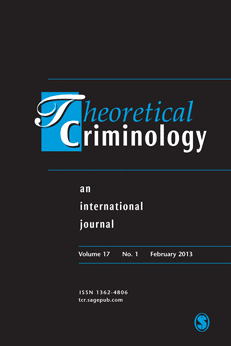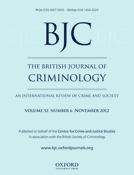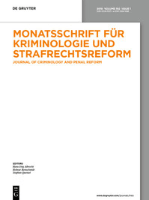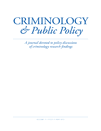
THEORETICAL CRIMINOLOGY
Scope & Guideline
Unveiling New Perspectives in Criminology
Introduction
Aims and Scopes
- Critical Examination of Criminal Justice Systems:
The journal publishes research that critically analyzes various criminal justice systems worldwide, exploring their structures, functions, and impacts on society, particularly in relation to marginalized communities. - Intersections of Crime and Social Issues:
Research often investigates the intersections of crime with broader social issues such as race, gender, class, and immigration, aiming to understand how these dynamics influence criminal behavior and justice processes. - Global and Comparative Perspectives:
The journal encourages contributions that take global and comparative approaches to criminology, examining how different cultural and political contexts shape crime and punishment. - Innovative Methodologies:
Methodologically diverse, the journal includes qualitative, quantitative, and mixed-methods research, emphasizing innovative approaches to studying crime and justice. - Focus on Emerging Forms of Crime:
Research on emerging forms of crime, such as cybercrime, human trafficking, and state violence, is a core focus, reflecting the evolving nature of criminality in contemporary society.
Trending and Emerging
- Carceral Studies and Penal Practices:
There is a notable increase in research related to carceral studies, exploring the implications of incarceration, detention practices, and the broader carceral state, especially in light of contemporary debates on mass incarceration and criminal justice reform. - Impact of Technology on Crime and Policing:
Emerging themes around the impact of technology, including algorithmic policing, surveillance, and digital data management, are gaining traction, reflecting concerns about privacy, civil liberties, and the future of policing. - Transnational and Global Perspectives on Crime:
The journal is increasingly publishing work that examines crime in transnational contexts, focusing on issues such as migration, border control, and international crime networks, highlighting the complexities of globalization. - Critical Race and Feminist Criminology:
There is a rising emphasis on critical race theory and feminist perspectives in criminology, addressing how intersecting identities influence experiences of crime and justice. - Socio-political Movements and Crime:
Research examining the relationship between socio-political movements, such as Black Lives Matter or anti-police protests, and crime is emerging strongly, reflecting societal shifts and the role of activism in shaping criminal justice policies.
Declining or Waning
- Traditional Theories of Crime:
There seems to be a decline in the publication of papers centered around classical criminological theories that do not engage with contemporary issues, as the journal shifts towards more critical and interdisciplinary approaches. - Focus on Western-centric Perspectives:
Research that solely focuses on Western contexts, without considering global implications or comparative analyses, is becoming less common as the journal aims to diversify its scholarly contributions. - Reductionist Views on Crime Causation:
Papers offering overly simplistic or reductionist views of crime causation, such as solely biological or psychological explanations, are less frequently published, as the journal emphasizes complex social, political, and economic factors.
Similar Journals

BRITISH JOURNAL OF CRIMINOLOGY
Leading the way in interdisciplinary criminology research.The British Journal of Criminology is a premier peer-reviewed journal published by Oxford University Press, dedicated to advancing the field of criminology through rigorous research and scholarly discourse. With an ISSN of 0007-0955 and an E-ISSN of 1464-3529, this esteemed publication has been at the forefront of criminological studies since its inception in 1960, continuing to provide vital insights into crime, justice, and societal impacts suited for both academics and practitioners alike. The journal is recognized for its high academic standards, proudly positioned in the Q1 category across multiple scholarly disciplines, including Arts and Humanities, Law, Pathology and Forensic Medicine, and Social Psychology as per the 2023 evaluations. While it does not offer open access, the journal remains a critical resource for researchers and professionals seeking to deepen their understanding of criminological theory and practice. With a strong commitment to promoting interdisciplinary approaches, the British Journal of Criminology aims to foster innovative research that addresses contemporary challenges within the realms of crime and justice.

Annual Review of Criminology
Navigating the Complexities of Crime and Society.The Annual Review of Criminology is a premier academic journal dedicated to advancing the field of criminology through comprehensive reviews of the latest research and emerging trends. Published by Annual Reviews, this journal is highly regarded within the legal realm, boasting a prestigious Q1 ranking in the Law category and an impressive Scopus rank of #13 out of 1025, indicating its significant influence with a 98th percentile standing. The journal focuses on synthesizing key developments from various branches of criminology, making it an essential resource for researchers, professionals, and students alike. Although it does not offer open access, readers can engage with high-quality, peer-reviewed articles that not only address contemporary issues but also provide foundational knowledge for future inquiries. With volumes converging from 2018 to 2021 and 2023 to 2024, the Annual Review of Criminology underscores its commitment to scholarly excellence and the dissemination of critical insights in the evolving landscape of criminal justice.

Critical Criminology
Illuminating the Shadows of Criminal Behavior.Critical Criminology is an esteemed academic journal published by Springer, focusing on the interdisciplinary examination of crime and justice through a critical lens. With its ISSN 1205-8629 and E-ISSN 1572-9877, this journal provides a platform for innovative research that challenges mainstream criminological perspectives and explores the socio-political dimensions of crime. Recognized for its scholarly rigor, it holds a prestigious Q1 ranking in Law and a Q2 ranking in Sociology and Political Science, showcasing its vast influence in the field. The journal serves as an essential resource for researchers, practitioners, and students interested in the complexities of crime and the multitude of factors influencing criminal behavior. Although it operates under a subscription model, its significance is underscored by high performance metrics, including a remarkable 88th percentile rank in the Law category of Scopus, affirming its critical role in advancing criminological scholarship. Based in the Netherlands, Critical Criminology continues to attract contributions that shed light on contemporary issues and pursue paths of social justice and reform.

Revista Criminalidad
Unveiling Insights into Criminal BehaviorRevista Criminalidad, published by POLICIA NAC COLOMBIA, is a distinguished academic journal that has been open access since 1958, making critical research in the field of criminology readily available to the global scholarly community. Based in Colombia, this journal serves as a prominent platform for the dissemination of high-quality research on crime, law, and social sciences. Notably categorized in various quartiles for 2023, including Q2 in Arts and Humanities (miscellaneous) and Q3 in Law, it holds respectable rankings in the Scopus database, reflecting its significance and contribution to both academic and practical discourse. The journal invites researchers, professionals, and students to explore its comprehensive scope, spanning vital themes relevant to criminology and public safety, making it an essential resource for those invested in the interplay between society, law, and criminal behavior. For up-to-date research and insights, the journal is accessible at the CENTRO INVESTIGACIONES CRIMINOLOGICAS DIJIN, AVE EL DORADO 75-25, BOGOTA.

Journal of Experimental Criminology
Pioneering Research in Crime Prevention and JusticeThe Journal of Experimental Criminology, published by Springer, stands as a beacon of innovation within the realm of criminology and legal studies. With an ISSN of 1573-3750 and E-ISSN 1572-8315, this esteemed journal, based in the Netherlands, explores groundbreaking research and experimental approaches to understanding criminal behavior and justice systems. It proudly resides in the elite Q1 quartile of the law category for 2023, ranking an impressive #37 out of 1025 in Scopus within the Social Sciences _ Law domains, placing it in the 96th percentile among its peers. The journal's objectives are aimed at disseminating high-quality empirical research that informs policy and practice, making it an essential resource for scholars, practitioners, and students who strive to enhance the efficacy of crime prevention and criminal justice interventions. With coverage spanning from 2005 to 2024, the Journal of Experimental Criminology invites contributors from diverse backgrounds to engage in the interdisciplinary dialogue that shapes the future of criminological research.

Revista General de Derecho Penal
Navigating the complexities of penal legislation.Revista General de Derecho Penal, published by IUSTEL, is a premier academic journal dedicated to the dynamic field of criminal law. With an ISSN of 1698-1189, this journal serves as a crucial platform for researchers, legal professionals, and students to share their insights and findings related to penal law and its evolving applications in contemporary society. Although it is not an open access journal, it maintains high scholarly standards, helping to advance discourse in legal studies. The journal's address is C PRINCESA NO 29, 2A DCHA, MADRID 28008, SPAIN, positioning it within a vibrant academic community. With a focus on current legal challenges and theoretical advancements, Revista General de Derecho Penal plays an essential role in fostering understanding and developing effective legal frameworks in criminal justice, making it an invaluable resource for those engaged in the study and practice of law.

Russian Journal of Criminology
Bridging cultural perspectives in the study of criminology.Russian Journal of Criminology (ISSN: 2500-4255, E-ISSN: 2500-1442) is an esteemed academic publication hosted by Baikal State University, dedicated to advancing the field of criminology. As a pivotal resource within the domains of law and social sciences, this journal offers a platform for scholars to disseminate innovative research, critical analyses, and comprehensive studies relevant to contemporary criminological issues. Although coverage has been discontinued in Scopus from 2020, the journal continues to provide valuable insights essential for professionals and researchers alike, with a focus on sociological and political perspectives on crime and justice systems. With its unique Russian context, the journal encourages a diverse array of submissions, facilitating a cross-cultural dialogue on criminology that contributes to global scholarship. Despite its current ranking of 478 out of 685 in law and 908 out of 1243 in sociology and political science, the Russian Journal of Criminology remains a vital resource for those seeking to explore the complexities of criminological phenomena and to further the academic discourse in this critical area of study.

Monatsschrift fur Kriminologie und Strafrechtsreform
Innovative Insights into Law and Justice.Monatsschrift für Kriminologie und Strafrechtsreform is a prestigious academic journal dedicated to advancing the fields of criminology and legal reform. Published by WALTER DE GRUYTER GMBH in Germany, this journal boasts a significant history since its inception in 1943, continually evolving its focus and scope from 2010 to 2024 to address contemporary issues in law and criminal justice. With an impressive Q2 rating in Law and a ranking in the 46th percentile among social sciences law journals, it serves as a vital resource for researchers, practitioners, and students alike. By publishing innovative articles, critical reviews, and comprehensive studies, the journal aims to foster academic discourse and propel discussions surrounding legislative reforms and criminological theories. Although it does not currently offer open access, readers can obtain valuable insights that contribute to both academic scholarship and practical applications in the legal field, thereby enhancing the understanding of complex societal dynamics related to crime and law enforcement.

Criminology & Public Policy
Shaping Policies with Evidence and InsightCriminology & Public Policy, published by Wiley, is an esteemed journal that plays a pivotal role in the interdisciplinary fields of law, public administration, and literature. With a focus on innovation and empirical research, this journal addresses critical issues surrounding crime and justice while influencing policy decisions globally. The journal boasts a prestigious impact factor, reflecting its significant contribution to academic discourse, particularly noted for its top quartile rankings in the fields of Law, Literature and Literary Theory, and Public Administration in 2023. As a resource for researchers, practitioners, and policymakers, Criminology & Public Policy aims to bridge the gap between theory and practical application, presenting cutting-edge analyses and insights that are vital for addressing contemporary societal challenges. By providing a platform for rigorous scholarship, this journal supports the advancement of knowledge and fosters informed discussions that shape effective public policies.

PSYCHOLOGY CRIME & LAW
Illuminating the Psychology Behind Criminal JusticePSYCHOLOGY CRIME & LAW, published by Routledge Journals, Taylor & Francis Ltd, is a premier academic journal dedicated to the intersection of psychology, criminology, and the law. With an ISSN of 1068-316X and an E-ISSN of 1477-2744, this journal provides a critical platform for the dissemination of cutting-edge research and innovative methodologies in the fields of psychology, forensic medicine, and legal studies. Spanning over three decades (1994 to 2024), it holds impressive Scopus rankings, placing it in Q1 and Q2 quartiles for its contributions to law and forensic medicine, highlighting its standing within the academic community. PSYCHOLOGY CRIME & LAW is particularly noted for addressing contemporary issues at the crossroads of human behavior and legal standards, making it essential reading for scholars, practitioners, and students alike. While the journal is not open access, it offers valuable insights into a variety of topics, from criminal psychology to the implications of mental health in legal contexts, ensuring that it remains an influential resource for those engaged in research and professional practice.